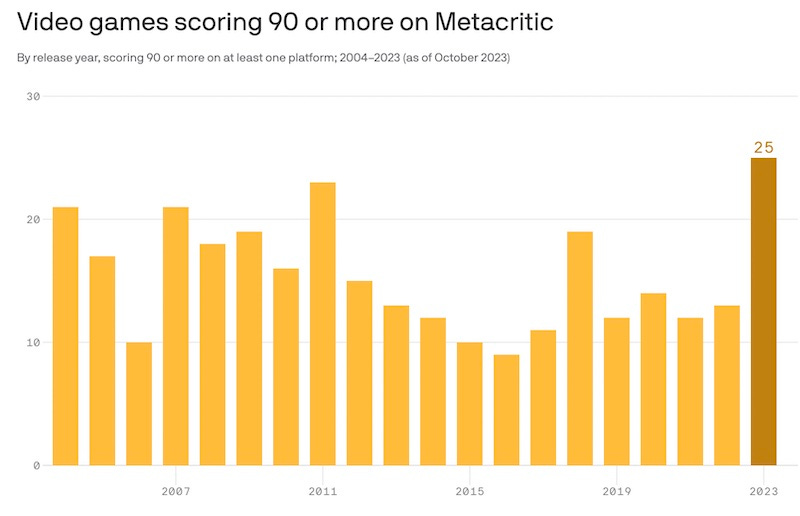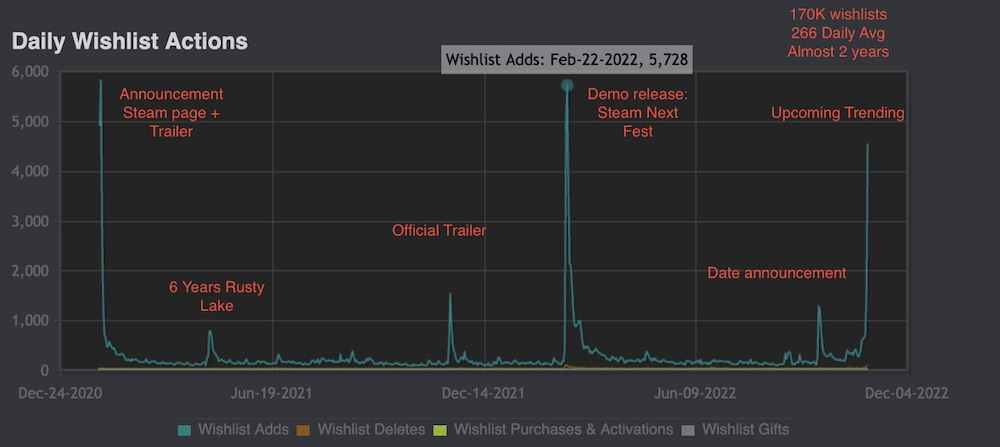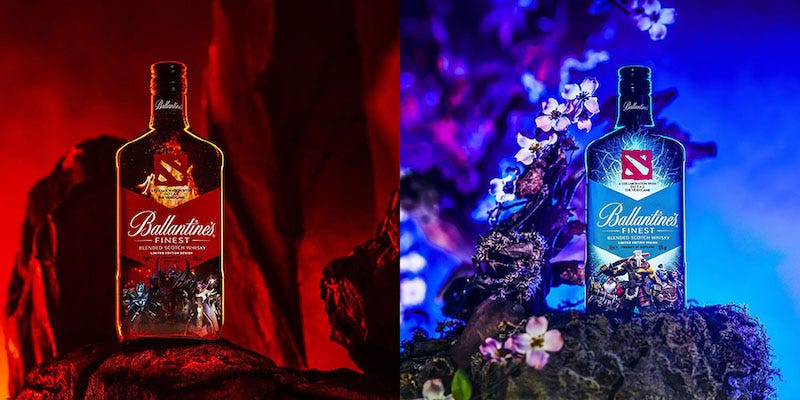How Rusty Lake's 'immersive puzzle' worlds sell millions!
Publikováno: 1.11.2023
Also: an update on F2P PC games outside of Steam, and lots of news.
[The GameDiscoverCo game discovery newsletter is written by ‘how people find your game’ expert & company founder Simon Carless, and is a regular look at how people discover and buy video games in the 2020s.]
And we’re back, with the first of a number of profiles of smaller, successful PC (and in this case, mobile) games or game series - Rusty Lake. And why are select smaller devs prospering, even in 2023? In part, it’s about (low) barriers to entry.
Why? On one level, to make games, you don’t need a big office, company, or cash - just a computer & your brain. But also - when you have enough creators out there, X% will always be successful. And what we need to work out is.. why that X%? Let’s see…
[FINAL REMINDER: not messing around, it’s our first GameDiscoverCo Plus discount since June! For the next 48 hours, you get 25% offour upgraded Plus PC game data suite, weekly PC/console sales research, an exclusive Discord, six game discovery eBooks & more…]
Rusty Lake: how a ‘niche’ genres sold millions…
When we looked back at the Steam launches with the top CCU in September 2023, one game stood out. Sure, there’s Mortal Kombat 1, Party Animals, Starfield… but how about Underground Blossom? Amazingly, with 8,400 Steam CCU (concurrent users) at peak, it made it to the Top 10 CCU from all 900+ releases we tracked for the month.
It’s even more notable because Rusty Lake’s $5 USD game takes about two hours to complete for the first time, and is absolutely a linear, one-off story. So players were swarming to buy & play this title.
Firstly, what is it? As one Steam reviewer explains, it’s “set in a series of puzzling underground metro stations that each represent a different stage or event in Laura Vanderboom’s life… it’s a fantastic example of a point-and-click game and a Rusty Lake title.”
Interesting/unique combo, huh? And when we reached out to Rusty Lake’s Robin Ras, he passed along some pretty spectacular stats for their titles, as follows:
The studio’s 15+ gamesnow have more than 75 million downloads lifetime to date, mostly on mobile, where they are sometimes released for free with a ‘play full game’ unlock. The Asian markets are “almost 50% of our player base”, intriguingly, according to Ras.
Rusty Lake’s paid player-base has shifted somewhat away from mobile over time, though. Robin says: “When we released our first 3 premium games (start of 2018), mobile also had our biggest percentage of premium players: 70% mobile (iOS App Store and Google Play) and 30% on PC (Steam/Itch.io).”
But more recently, possibly due to discovery changes on mobile, the player-base for premium purchases has shifted towards PC: “[It’s now] 60% (Steam) and 35% mobile (Apple App Store and Google Play), with 5% for the other platforms (Itch.io and GOG).”
Ras was also able to reveal two milestones for recent titles: firstly, they have recently hit one million units sold on $6 co-op puzzler The Past Within on Steam. And secoindly, for Underground Blossom, “we are still processing the data, but the numbers are looking great so far - with more than two hundred fifty thousand units sold in the first month across all platforms.”
This is all particularly interesting because Rusty Lake is prospering with a small team (just four full-time employees, plus freelancers), making short, cheap narrative games of a kind you might not expect to be this huge. So we quizzed Robin some more on how this all went down:
Q: Can you talk a little bit about the foundation of Rusty Lake as a studio? (You started out making the Cube Escape games, right?)
Robin: I’m Robin Ras, and together with Maarten Looise we founded Rusty Lake back in 2015. Before Rusty Lake we were already very active in the Flash game era, creating a lot of news-based games which we distributed through our own web gaming portals. Quite a few of those games went viral, but the popularity only lasted as long as the news topic was relevant...
After experimenting with the point and click/escape room genre we came up with the idea to create a universe filled with adventure games, which had an atmosphere that reminded of David Lynch’s TV series, Twin Peaks, a series we were big fans of. We also had a clear vision to create a community of players eagerly waiting for new chapters.
The only way to achieve this (in our minds) was to publish the (first) games for free… The first year alone, we released 7 Cube Escape games [now compiled on Steam for $5!], including our first premium game: Rusty Lake Hotel, which was basically our [bridge] to a sustainable business model for our studio.
Q: Your games fulfil a super interesting niche in the ecosystem - short(er), cheap, but you've built a massive fanbase. (It seems like not many games like this graduated from Flash games in to the modern era.) What's the magic thing your fans love?
Robin: We’ve built the universe, the community and studio step-by-step over the past 8 years. With every new game release, we’ve done our best to improve the overall quality by lengthening the games, extending & deepening lore, working with the right composers / sound designers, improving the UI & adding voice overs and translations.
We also invested a lot of our resources into business development; talking with the platform holders, trying out different business models (cross-promotion, ads, IAPs), launching a Kickstarter for a short film / game crossover (Cube Escape: Paradox) and creating specific social media accounts in markets where we performed really well; South Korea, Japan and China.
We also spent half of our time keeping our community engaged, both online via our socials, website, newsletter, but also ‘offline’. We try to draw players into the universe and its mysteries in every way we can; e.g. creating an ARG (Alternate Reality Game) for The White Door where fans had to find physical cubes around the world through a 90’s website.
It is also important to note that players also know what to expect when they download a new Rusty Lake game; the gameplay is point-and-click, the art is recognizable, there will be enough challenging puzzles and there is [an] atmosphere with a lot of weird and eerie stuff they will enjoy.
Q: We're interested in why you chose to make The Past Within co-op. What was the thinking behind that, and did it pay off in terms of more people wanting to play it overall?
Robin: The Past Within was designed as a single player adventure first, combining our classic 2D graphics with 3D for the first time. After a lot of prototyping, we had the idea of separating the 2D and the 3D environment from each other, playable by two players who need to communicate with each other.
We got all excited about creating the first co-op game for our community. However, not everyone was as happy when we announced it. So during the 2.5 year dev process, we tried to convince them [by explaining the idea carefully, and adding] Discord infrastructure to help people find a partner to play with.
In the end, choosing co-op paid off. The majority of our core community really enjoyed the experience, and we reached a big audience that was interested in co-op, something we were never able to reach before.
—
Finally, although Rusty Lake has experimented with ‘surprise’ releases, like they did in 2020 with Samsara Room, “which turned out to be a huge success with over 1.5 million downloads on PC, and around 9 million downloads on mobile”, they’ve been much more pre-release ‘Hype’ and wishlist-conscious since then.
For example, here’s the Steam daily wishlist numbers leading up to release for The Past Within, their biggest and most complex release to date:
Interestingly, on mobile, they use a similar strategy: “Building up the pre-orders (Apple App store) and pre-registrations (Google Play), together with a demo / Lite version, to give players a taste of the full premium release.” Pre-orders and registrations have become more important on mobile, in terms of marketing for certain types of games…
As for the future of Rusty Lake, they tell me they have “new and interesting projects in the pipeline for our publishing branch Second Maze”, and are considering “a project that is bigger than anything we have done before” on the Rusty Lake side. And good luck to ‘em!
Follow-up: how about PC F2P outside of Steam?
We analyzed the top Steam F2P PC games the other week, and commenter ‘Hagra’ made a good point - which we did say in the article, but is worth repeating: “Steam is not really a great proxy” for success on F2P games on PC in general.
They add: “Tower of Fantasy et al only really looks good here because MiHoYo's behemoths don't use Steam, but they have enormous playerbases. And a lot of the other big Asian F2P live service titles aren't on Steam either. While I don't have numbers, for example, I suspect Honkai: Star Rail would very likely dwarf all of these combined.”
So let’s talk about this a second. It’s very difficult to launch PC F2P games outside of Steam successfully, especially in 2023. But some companies have definitely managed it. Just listing some of these non-Steam standouts, so we’re all on the same page:
Riot’s games - particularly League Of Legends & Valorant: everyone knows that League Of Legends is a giant worldwide phenom - in 2021 Riot reported 180 million MAU across all PC & mobile LoL-related titles, with a decent chunk of that being PC-specific. And separately of that, first-person shooter Valorant apparently has 28 million MAU too, according to a recent Bloomberg piece.
Epic’s Fortnite (& Rocket League & Fall Guys, kinda): obviously, Epic’s Fortnite is the backbone for the Epic Games Store on PC, which reached 68 million MAUs in 2022. But it’s worth remembering that after Epic bought both Rocket League and Fall Guys, it made it so existing players can still play on Steam, but all new sign-ups are via EGS.
MiHoYo’s action RPG Genshin Impact & turn-based RPG Honkai: Star Rail: as our commenter said, these titles are huge worldwide. AppMagic estimates $3.8 billion LTD mobile revenues for Genshin, and $573 million for Honkai - so we’d guesstimate PC revenues to be… up to 10% of that? (Genshin Impact on PC is kinda sorta on Epic Games Store, btw, but mainly as a payment integration.)
There’s a few other big ‘PC, but not on Steam’ titles worth mentioning - from Roblox to extraction shooter Escape From Tarkov (which is a rare Western standout, and which Game Seer’s Bertrand wrote about recently in the context of ‘Steam escape velocity’)
Oh, and busty gacha game Nikke: Goddess Of Victory ($390 million on mobile!) also has a synced PC version that may be doing decently. And there are certainly other Asian titles which have good crossover potential from mobile to PC.
But in general, getting that ‘escape velocity’ outside of Steam for a F2P PC game? Tricky in today’s market if you don’t have a massive userbase already, or don’t have a hit mobile version to cross-sell people against. (And sure, many games on Steam have a non-Steam PC version, cos why wouldn’t you? But it may not be a big % of users…)
Finally, we decided to compare mobile to Steam revenues[Google Drive link] for those Top 30 ‘new Steam F2P games of 2022 & 2023’ we previously profiled. Thanks to AppMagic for the mobile data. And it’s intriguing, for sure.)
For example, GameDiscoverCo/Gamalytic estimated Marvel Snap’s Steam/PC revenue at $19 million gross, which is a small (just over 10%!) but still helpful percentage of the game’s $119 million lifetime mobile revenue to date.
On the other hand, we’re seeing some Asian games like tactical RPG/visual novel combo Limbus Company(above) split revenue pretty equally between Steam on PC ($9.5 mil) and mobile ($7.7 mil). Undecember similarly is estimated to be $15.3 mil on Steam and $22 mil on mobile.
Sure, these are gacha-heavy games made firstly for the Asian market - Limbus Company has 34% Korean and 17% Chinese reviews and Undecember about 28% Chinese (although 24% Russian!) But there’s worldwide interest here - and it’s super interesting to get some estimates on PC/mobile revenue crossover, even experimental.
The game discovery news round-up..

And before we finish the discovery news round-ups for the week, we have this final humdinger, this ultimate compendium, this last longing gaze at what’s going on:
PlayStation things: the new PlayStation 5 x Call Of Duty bundle is $499 in the U.S., effectively making MW3 ‘free’; PS+ Essential monthly games for Nov are Mafia II: Definitive Edition, Dragon Ball: The Breakers and Aliens Fireteam Elite; here’s a side-by-side look at old and ‘new’ PS5 designs, size-wise.
SteamDataSuite has been looking at all 117 million Steam reviews, and discovered a couple of neat things: 0.6% of all reviews got a developer response, but 79.6% of all games don’t have a single dev reply. (Oh, and 78% of all games have <100 Steam reviews in total.)
Patents reliably spawn fun rumors, so we’re showing you Nintendo’s latest patent, “a dual-screen gaming device, that can be split in half… instead of the clamshell design which saw the top screen fold in onto the bottom screen, this design sees the top screen face out, even when the machine is closed over.” Intriguing idea - but not Switch 2?
MrBeast & Dream’s manager Reed Duchscher showcased a ‘how kids 4-12 consume content’ survey in his latest Night newsletter, noting that YouTube ads drive almost 3x kid purchase requests compared to TV or TikTok - but “parents are a third more likely to worry about their kid using TikTok compared to YouTube.”
Apple announced its M3 processors for its computers & The Verge notes that, while the tech is impressive: “How this all translates into the state of gaming on the Mac is unclear.” Sergei Galyonkin then riffs on the issue, suggesting: “If Apple is serious about making Macbooks an actual gaming platform, it must make [Apple’s Game Porting Toolkit] a native user-friendly part of the Mac OS.”
Xbox’s latest set of Game Pass game announcements seem, as always, interesting and well-picked: Thirsty Suitors and Jusant on the ‘cool indie’-r side, Football Manager 2024 for sim fans, Like A Dragon Gaiden: The Man Who Erased His Name (a great get!) for Yakuza nerds, and a late add for Wild Hearts via EA Play.
Interesting to read Rami Ismail’s take on publisher feedback and ‘pitch stalling’, which is publisher-adversarial but makes some fair points: “As publishers can take fewer bets, they're more picky about the ones they take. This often means slowing down the process to have more overview of potential opportunities.”
Console microlinks: Xbox is blocking unauthorized third-party controllers starting in November, giving issues for some niche controller makers; No Gravity Games are still doing the ‘100% off chained giveaway’ on Switch trick, somehow; PlayStation’s UI got updated to show streamable games, which PS+ Premium subscribers can access.
Over at Axios, they discovered that 2023’s games are well reviewed: “This year has seen 25 games pull an average score of 90 or more on at least one platform, according to review aggregator Metacritic. For most of the last decade, the average count has been half of that.” More detail in the above chart, and here’s some of the year’s top-rated…
HowToMarketAGame took a look at an ‘underperforming’ automation/builder game on Steam, Forge Industry, which “launched Jul 21, 2023 and sold 104 units the first week for a gross revenue of $1,824”, despite being in a hot genre - some interesting analysis of the team’s own YouTube video deconstructing its launch.
Misc. microlinks: why Blade Ball has continued to surge in Roblox popularity; Amazon Prime Gaming adds Star Wars: Knights Of The Old Republic & more for November; an updated look at ‘12 ways to take Battles Passes to the next level’ in mobile games.
Finally, since we dig surprising cross-promo, how about this? “To celebrate the 10-year anniversary of Dota 2… Ballantine’s Scotch whiskey has teamed up with Valve’s popular MOBA to… see the limited [China-only] release of Ballantine’s Finest x Dota 2 bottles featuring… characters including Juggernaut, Lina, Monkey King, Marci, and Brewmaster.” Hic.
[We’re GameDiscoverCo, an agency based around one simple issue: how do players find, buy and enjoy your PC or console game? We run the newsletter you’re reading, and provide consulting services for publishers, funds, and other smart game industry folks.]

